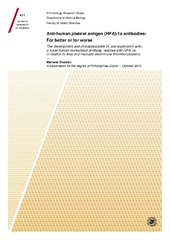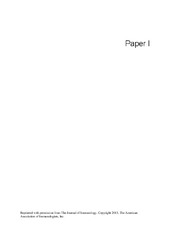| dc.contributor.advisor | Stuge, Tor Brynjar | |
| dc.contributor.author | Eksteen, Mariana | |
| dc.date.accessioned | 2016-02-26T08:32:56Z | |
| dc.date.available | 2016-02-26T08:32:56Z | |
| dc.date.issued | 2015-12-11 | |
| dc.description.abstract | Albeit a rare pregnancy complication, fetal and neonatal alloimmune thrombocytopenia (FNAIT) due to anti-human platelet antigen (HPA)-1a antibodies carries a significant risk of intracranial bleeding in the fetus and newborn. Reduced birth weight is another possible complication of FNAIT. Currently, there is no specific treatment to prevent or treat FNAIT, neither exist screening programs identifying women at risk of having a baby affected by FNAIT. Prophylactic and therapeutic strategies have been proposed, and the debate on screening programs is intensifying in several countries. The potential of polyclonal anti-HPA-1a IgG to prevent HPA-1a immunization is currently being tested in clinical trials. In this study we have developed a human monoclonal antibody (mAb) highly specific for HPA-1a, named 26.4. By in vitro experimentation, we have shown that this mAb can potentially be developed into a drug to specifically prevent maternal immunization to HPA-1a by potentiating the removal of fetal platelets from maternal circulation prior the immunization takes place. We have also demonstrated that this mAb outcompetes maternal anti-HPA-1a antibodies for binding to the antigen, and therefore mAb 26.4 can also be developed into a drug to treat FNAIT, by protecting fetal platelets from potentially harmful maternal anti-HPA-1a antibodies in cases when the immunization has already occurred. We have also shown that this mAb can be used as a diagnostic reagent to identify women at risk of HPA-1a immunization, as well as a standard for quantitation of anti-HPA-1a antibodies. Using an in vitro model, we have found that anti-HPA-1a antibodies affect trophoblast functions crucial for placental development. The latter finding sheds light on one of the possible causes of the reduced birth weight in FNAIT-affected babies. | en_US |
| dc.description.doctoraltype | ph.d. | en_US |
| dc.description.popularabstract | Anti-humant blodplate antigen (HPA)-1a antistoffer: På godt og vondt
Potensielt skadelige antistoffer, som dannes i enkelte svangerskap, kan bli brukt til nytte. Et unikt humant monoklonalt antistoff (mAb), mAb 26.4, spesifikt for HPA-1a kan potensielt bli en kur for føtal og neonatal alloimmun trombocytopeni (FNAIT).
FNAIT forårsaket av anti-HPA-1a antistoffer bærer en betydelig risiko for intrakraniell blødning hos foster og nyfødt. Redusert fødselsvekt er en annen mulig komplikasjon av FNAIT. Foreløpig eksisterer ingen spesifikk terapi å forebygge eller behandle FNAIT. Profylaktiske og terapeutiske strategier har blitt foreslått, og debatten om screeningprogrammer intensiveres i flere land. I denne studien har et humant mAb strengt spesifikt for HPA-1a blitt utviklet. In vitro eksperimentering viser at dette mAb har kvaliteter som kan brukes for behandling og diagnostikk: det kan utvikles til et stoff for å spesifikt forhindre mors immunisering til HPA-1a ved potent fjerning av fosterets blodplater fra morens sirkulasjon før immunisering skjer. Dette mAb kan også utvikles til et legemiddel til behandling av FNAIT ved å beskytte fosterets blodplater fra skadelige maternelle anti-HPA-1a antistoffer når immunisering allerede har skjedd. Videre, har potensialet av dette mAb som et diagnostiskt reagens i FNAIT blitt evaluert. I tillegg har dette mAb blitt brukt som et reagens for å undersøke biologiske implikasjoner av slike antistoffer i svangerskap: ved hjelp av en in vitro modell, har vi funnet ut at anti-HPA-1a antistoffer påvirker trophoblast funksjoner avgjørende for morkake utvikling. Dette funnet belyser en av de mulige årsakene til redusert fødselsvekt i FNAIT. | en_US |
| dc.description.sponsorship | The Norwegian Research Council | en_US |
| dc.description | Papers number II and III of this thesis are not available in Munin:
<br>Paper II. A novel human monoclonal human platelet antigen (HPA)-1a-specific antibody can serve as a diagnostic reagent in fetal and neonatal alloimmune thrombocytopenia. Eksteen M, Kjaer M, Husebekk A, Skogen BR, Stuge TB. (Manuscript)<br>Paper III. Anti-human platelet antigen (HPA)-1a antibodies affect trophoblast functions crucial for placental development: A laboratory study using an in vitro model. Eksteen M, Heide G, Tiller H, Zhou Y, Hersoug Nedberg N, Martinez IZ, Husebekk A, Skogen BR, Stuge TB, Kjaer M. (Manuscript) | en_US |
| dc.identifier.uri | https://hdl.handle.net/10037/8568 | |
| dc.identifier.urn | URN:NBN:no-uit_munin_8136 | |
| dc.language.iso | eng | en_US |
| dc.publisher | UiT The Arctic University of Norway | en_US |
| dc.publisher | UiT Norges arktiske universitet | en_US |
| dc.rights.accessRights | openAccess | |
| dc.rights.holder | Copyright 2015 The Author(s) | |
| dc.rights.uri | https://creativecommons.org/licenses/by-nc-sa/3.0 | en_US |
| dc.rights | Attribution-NonCommercial-ShareAlike 3.0 Unported (CC BY-NC-SA 3.0) | en_US |
| dc.subject | VDP::Medical disciplines: 700::Basic medical, dental and veterinary science disciplines: 710::Medical immunology: 716 | en_US |
| dc.subject | VDP::Medisinske Fag: 700::Basale medisinske, odontologiske og veterinærmedisinske fag: 710::Medisinsk immunologi: 716 | en_US |
| dc.title | Anti-human platelet antigen (HPA)-1a antibodies: For better or for worse | en_US |
| dc.type | Doctoral thesis | en_US |
| dc.type | Doktorgradsavhandling | en_US |


 English
English norsk
norsk

